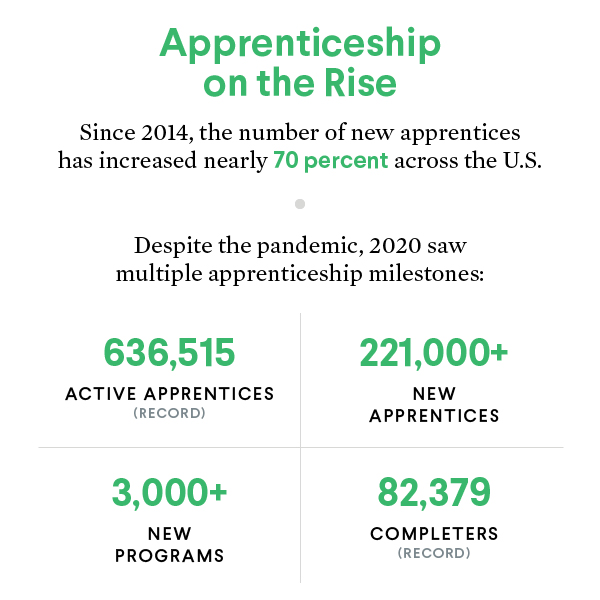
This National Apprenticeship Week, Let’s Support Employers in Developing Equitable Apprenticeships
November 15, 2021
At a Glance
Apprenticeship can put workers on pathways to jobs in well-paid careers, but many workers don’t have opportunities to benefit from all that apprenticeship offers. JFF calls on employers to take our pledge to promote inclusion and diversity in apprenticeship.
At JFF, we’re enthusiastic advocates of apprenticeship. As part of our mission to build a society in which everyone has the skills, resources, and credentials they need to achieve economic advancement, we actively seek out opportunities to work with employers and other stakeholders to design and implement new apprenticeship projects so we can make these proven earn-and-learn training experiences accessible to as many workers and learners as possible.
Apprenticeship has a long track record of success, and data from the U.S. Department of Labor (DOL) indicates that it is still the nation’s most effective workforce program in terms of its capacity to equip workers with the skills they need for newly created jobs, put people on pathways to careers that pay family-supporting wages, and improve workforce retention rates.
U.S. apprenticeship currently mirrors the inequities of the U.S. workforce writ large.
The model has experienced incredible growth over the past six years, with increased interest among employers in industries such as IT, health care, and cybersecurity. According to the DOL, the number of new apprentices has increased almost 70 percent since 2014, and growth was especially vigorous in 2020. Despite the pandemic, there were 636,515 active apprentices last year, and 82,379 people completed apprenticeships—both all-time highs.

Numbers like those suggest that employers, training providers, workers, and learners share JFF’s view of the benefits of this well-established model.
They know that through apprenticeship, students and workers obtain high-quality training that leads to good jobs and good wages (the average salary of journeyworkers is more than $70,000 a year). Moreover, apprentices earn money while they learn, don’t need to take on student loan debt, acquire the skills that their local employers currently need, and earn industry-recognized credentials vital to their jobs and careers.
Businesses also see strong return on investment: Employers that offer apprenticeships expand their talent pipelines, build skilled workforces, and give incumbent workers opportunities to update their skills. They also see retention rates of 94 percent among employees who complete apprenticeships.
Troubling Statistics
However, as we celebrate all that apprenticeship has to offer this National Apprenticeship Week, we must acknowledge that there’s a lot more work to do if we want these opportunities to be accessible to all.
The problem is clear: Apprenticeship programs as a whole do not reflect the demographics of our communities or our country. Quite simply, they lack diversity. U.S. apprenticeship currently mirrors the inequities of the U.S. workforce writ large: Most apprentices are white males, and a large—and growing—cross section of the workforce is missing out on the promise of apprenticeship.
While women represent more than half of the U.S. population, the DOL reports that they accounted for less than 9 percent of registered apprentices from 2010 to 2019. Meanwhile, Black apprentices completed programs at a rate of only 24 percent.
These trends hurt workers and employers alike. The workers who lack access to apprenticeship are missing out on proven opportunities to get on pathways to well-paid careers. And employers are missing out on the talents of a significant cross-section of the population, as well as the competitive edge they could gain with a workforce made up of people who have a diverse range of skills and perspectives.
Presidential Support
Apprenticeship has benefited from strong bipartisan support. Presidents Barack Obama, Donald Trump, and Joe Biden have all been enthusiastic advocates of the apprenticeship model. Soon after his inauguration in early 2021, Biden called for additional funding and significant support for employers and workers to use apprenticeships to fill existing vacancies and newly created jobs with well-trained, local workers from all backgrounds.
On November 12, Biden reemphasized his support through a presidential proclamation that highlighted the urgent need for all Americans to have the opportunity to participate in apprenticeship.
Every step we take will bring the country closer to the day when Registered Apprenticeships are truly diverse, equitable, inclusive, and accessible.
Looming Talent Shortage
Because of the country’s rapidly shifting demographics and labor shortages that have emerged in the wake of the COVID-19 pandemic, U.S. employers could soon face a talent shortage that puts them at a competitive disadvantage if they don’t start to diversify now. As we noted earlier, women account for more than 50 percent of the population but are significantly underrepresented in many industries, including manufacturing. Moreover, the 2020 U.S. census shows that the white population has declined by 8.6 percent since 2010, and the Brookings Institution reports that “nearly four of 10 Americans identify with a race or ethnic group other than white.”
Improving diversity, equity, inclusion, and accessibility in apprenticeship will help employers avoid that looming talent shortage by providing workers from all demographic groups with opportunities to build in-demand skills through paid work-based learning. However, this will only happen if employers proactively make an intentional commitment to diversifying their apprenticeship programs.
Take the Pledge
At JFF, we are prepared to support employers who make that commitment. We recently entered into a four-year cooperative agreement with the DOL to establish a national center of excellence on diversity, equity, inclusion, and accessibility (DEIA) in Registered Apprenticeship that will provide employers with guidance and resources that will help them achieve their DEIA goals.
As a first step toward forging partnerships that will benefit companies, workers, and the U.S. economy, we’re inviting employers to publicly commit to this effort by signing our Business Pledge to Advance Diversity, Equity, Inclusion, and Accessibility in Registered Apprenticeship. Those who do will join like-minded organizations in a national community through which they will receive support, tips, best practices, and other resources to help them fulfill their pledge.
We call on employers and other apprenticeship stakeholders across the country to join us in this effort. Join us from 2:00 to 3:30 p.m. this Friday, November 19 to hear from leading employers, JFF President and CEO Maria Flynn, and U.S. Department of Labor Secretary Marty Walsh on the importance of this effort.
Be sure to register for the event below. Even if you aren’t available to participate on Friday, you’ll have an opportunity to be part of this historic initiative. We will notify you when the pledge is available for businesses to sign online.
We ask for you to share this pledge with the businesses in your network. Every step we take will bring the country closer to the day when Registered Apprenticeships are truly diverse, equitable, inclusive, and accessible, and when these valuable work-based learning experiences are within the reach of all Americans.
Related Content

Diversity, Equity, Inclusion, and Accessibility in Apprenticeship & WBL
Visit Our New Site for JFF's National Innovation Hub for Diversity, Equity, Inclusion, and Accessibility in Registered Apprenticeship! Visit JFF's Center for Apprenticeship & Work-Based Learning
Together We Can Increase Black Participation in Apprenticeship
As we honor Black History Month, an honest look at our racist past reveals a more equitable path for the future of apprenticeship and workforce development in our country.
